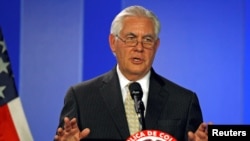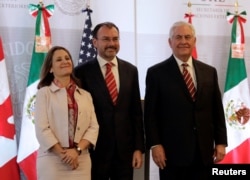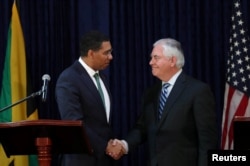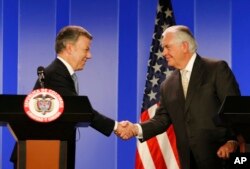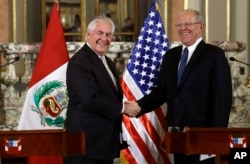U.S. Secretary of State Rex Tillerson says the United States is seriously considering imposing major restrictions on Venezuela's oil industry, and that President Donald Trump will make the decision.
As he was heading to Kingston, Jamaica, the last stop on a tour of Latin America and the Caribbean, Tillerson told reporters he wanted to consult with American allies in the region who would be effected by such a decision.
"And it was important because I wanted to hear their views, were we missing something, but also their views of whether taking action against oil, which would be pretty dramatic, how they felt about that," the secretary of state said.
Tillerson said the dire situation for the people of Venezuela, who are in the midst of an economic and humanitarian crisis under President Nicolas Maduro, and possible restrictions on oil have been on the agenda at every stop on his tour.
"We agreed in the trilateral in Mexico City with Mexico, Canada and the U.S. that we are going to put together a very small, very focused working group to see what we can do to mitigate a decision like that if we do take it," Tillerson said of imposing restrictions on Venezuelan oil. "Obviously it will be the president who decides."
Banning sales of Venezuelan oil in the U.S. and suspending refining of Venezuelan crude by American companies could further hurt the already suffering Venezuelan people, American businesses and Caribbean nations that depend on it. Tillerson acknowledged that this is all being considered as part of any decision.
In Kingston, the last stop on his five-nation tour, Tillerson met Wednesday with Jamaican Prime Minister Andrew Holness and Foreign Minister Kamina Johnson-Smith.
At a news conference with Holness, Tillerson said, "As to any future steps that the U.S. might take regarding sanctioning oil or products to put more pressure on the Maduro regime, we are going to take into full consideration the impacts on regional countries, as well."
He suggested the U.S. could make up for the shortfall created by such a ban.
"We stand ready to assist Jamaica and other partners in the Caribbean to explore and develop the resources they have, but also to share the abundance of resources that North America enjoys," Tillerson said.
A day earlier in Colombia, Tillerson said the United States is also rallying countries in the hemisphere to escalate the fight against a problem that's detrimental to the region — drug trafficking.
While encouraged by the progress made by Colombia in the reduction of coca growth, Tillerson cautioned Tuesday that "results are what matter."
"We need to see results, we need to see the trends reversing," Tillerson said at a news conference in Bogota with Colombian President Juan Manuel Santos.
Tillerson's remarks came days after U.S. President Donald Trump threatened to curb assistance to illicit drug hotspots.
Last week, Trump threatened to end aid to countries that fail to stop illegal drugs from pouring across the border, after a U.S. Customs and Border Protection official told him cocaine was primarily coming from Colombia and Peru, and trafficked through Mexico and Central America.
"There would be no supply of drugs if there's no demand, and there would be no demand if there is no supply," said Colombian President Santos, indicating the demand in the U.S. is part of the problem.
"We have lost our best leaders, our best journalists, our best judges, our best policemen in this war against drugs," said Santos, adding Colombia hoped to continue the cooperation with the U.S. to eradicate the production of coca, the source of cocaine.
Colombia receives major funding from the U.S. under the so-called "Plan Colombia," which is the name of the U.S. foreign aid, military and diplomatic initiative aimed at combating Colombian drug cartels and left-wing insurgent groups.
During his trip, Tillerson also continued advocating for the maximum pressure campaign against North Korea.
At the joint news conference in Bogota, the secretary of state urged Colombia to join the international community to voice concerns over North Korea's nuclear proliferation.
Earlier in Peru, Tillerson said Washington appreciates "the strong support that Peru has given the United States and the international community in pushing back on North Korea's nuclear weapons program."
"The recent sending home of diplomats from Peru is a very strong signal of Peru's position," said Tillerson at a news conference in Lima with President Pedro Pablo Kuczynski.
Secretary Tillerson's tour also took him to Argentina, where he talked with officials about conservation and diplomacy.




